
- Subject:
- Social and Behavioral Sciences
- Material Type:
- Module
- Author:
- OpenStax
- Date Added:
- 06/03/2021



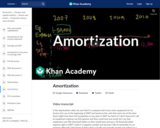
Introduction to amortization. Created by Sal Khan.

" This course focuses on alternative ways in which the issues of growth, restructuring, innovation, knowledge, learning, and accounting and measurements can be examined, covering both industrialized and emerging countries. We give special emphasis to recent transformations in regional economies throughout the world and to the implications these changes have for the theories and research methods used in spatial economic analyses. Readings will relate mainly to the United States, but we cover pertinent material on foreign countries in lectures."

This book provides an introduction to the study of meaning in human language, from a linguistic perspective. It covers a fairly broad range of topics, including lexical semantics, compositional semantics, and pragmatics. The chapters are organized into six units: (1) Foundational concepts; (2) Word meanings; (3) Implicature (including indirect speech acts); (4) Compositional semantics; (5) Modals, conditionals, and causation; (6) Tense & aspect.

This course focuses on the archaeology of the Greek and Roman city. It investigates the relationship between urban architecture and the political, social, and economic role of cities in the Greek and Roman world. Analyzes a range of archaeological and literary evidence relevant to the use of space in Greek and Roman cities (e.g. Athens, Paestum, Rome, Pompeii) and a range of theoretical frameworks for the study of ancient urbanism.
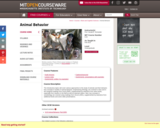
Most of the major categories of adaptive behavior can be seen in all animals. This course begins with the evolution of behavior, the driver of nervous system evolution, reviewed using concepts developed in ethology, sociobiology, other comparative studies, and in studies of brain evolution. The roles of various types of plasticity are considered, as well as foraging and feeding, defensive and aggressive behavior, courtship and reproduction, migration and navigation, social activities and communication, with contributions of inherited patterns and cognitive abilities. Both field and laboratory based studies are reviewed; and finally, human behavior is considered within the context of primate studies.

This is a free textbook teaching introductory statistics for undergraduates in Psychology. This textbook is part of a larger OER course package for teaching undergraduate statistics in Psychology, including this textbook, a lab manual, and a course website. All of the materials are free and copiable, with source code maintained in Github repositories.
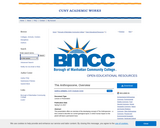
This presentation offers an overview of the developing concept of The Anthropocene -- a term coined to describe our current geological epoch, in which human impact on the planet will leave a permanent trace.
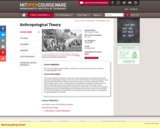
Seminar focuses on core issues and approaches in anthropological theory and method. Studies theoretical frameworks for the analysis and integration of material from other subjects in cultural anthropology. Subject provides instruction and practice in writing and revision whereby students produce one paper that is appropriate for publication or as a proposal for funding. This course introduces students to some of the major social theories and debates that inspire and inform anthropological analysis. Over the course of the semester, we will investigate a range of theoretical propositions concerning such topics as agency, structure, subjectivity, history, social change, power, culture, and the politics of representation. Ultimately, all theories can be read as statements about human beings and the worlds they create and inhabit. We will approach each theoretical perspective or proposition on three levels: (1) in terms of its analytical or explanatory power for understanding human behavior and the social world; (2) in the context of the social and historical circumstances in which they were produced; and (3) as contributions to ongoing dialogues and debate.
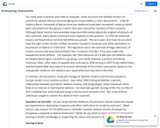
Assignment and discussion prompts for 100-level anthropology courses. Scoring criteria are included.
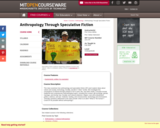
This class examines how anthropology and speculative fiction (SF) each explore ideas about culture and society, technology, morality, and life in "other" worlds. We investigate this convergence of interest through analysis of SF in print, film, and other media. Concepts include traditional and contemporary anthropological topics, including first contact; gift exchange; gender, marriage, and kinship; law, morality, and cultural relativism; religion; race and embodiment; politics, violence, and war; medicine, healing, and consciousness; technology and environment. Thematic questions addressed in the class include: what is an alien? What is "the human"? Could SF be possible without anthropology?
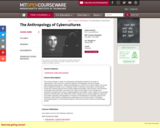
" This course explores a range of contemporary scholarship oriented to the study of 'cybercultures,' with a focus on research inspired by ethnographic and more broadly anthropological perspectives. Taking anthropology as a resource for cultural critique, the course will be organized through a set of readings chosen to illustrate central topics concerning the cultural and material practices that comprise digital technologies. We'll examine social histories of automata and automation; the trope of the 'cyber' and its origins in the emergence of cybernetics during the last century; cybergeographies and politics; robots, agents and humanlike machines; bioinformatics and artificial life; online sociality and the cyborg imaginary; ubiquitous and mobile computing; ethnographies of research and development; and geeks, gamers and hacktivists. We'll close by considering the implications for all of these topics of emerging reconceptualizations of sociomaterial relations, informed by feminist science and technology studies."
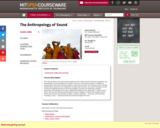
This class examines the ways humans experience the realm of sound and how perceptions and technologies of sound emerge from cultural, economic, and historical worlds. In addition to learning about how environmental, linguistic, and musical sounds are construed cross-culturally, students learn about the rise of telephony, architectural acoustics, and sound recording, as well as about the globalized travel of these technologies. Questions of ownership, property, authorship, and copyright in the age of digital file sharing are also addressed. A major concern will be with how the sound/noise boundary has been imagined, created, and modeled across diverse sociocultural and scientific contexts. Auditory examples--sound art, environmental recordings, music--will be provided and invited throughout the term.
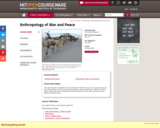
Issues of war and peace from an anthropological perspective. Topics include: the warlike nature of humans, if humans are by nature warlike, the evolution of war in cross-cultural perspective, the socialization of warriors and the construction of enemies, and the recent emergence of anti-war movements. Readings focus on sociobiological and other theories of war; anthropologists' claims to have studied societies that do not have war; ethnic hatred and civil war in Rwanda, Bosnia, and Northern Ireland; military culture in the U.S. and elsewhere; peace movements; and studies of military conversion.
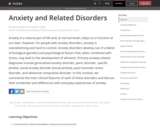
Text and links to all ancillary materials for Module 39

Develops facility with concepts, language, and analytical tools of economics. Covers microeconomics, macroeconomics, and international trade and payments. Emphasizes integration of theory, data, and judgment in the analysis of corporate decisions and public policy, and in the assessment of changing US and international business environments. Restricted to Sloan Fellows. The fact of scarcity forces individuals, firms, and societies to choose among alternative uses -- or allocations -- of its limited resources. Accordingly, the first part of this summer course seeks to understand how economists model the choice process of individual consumers and firms, and how markets work to coordinate these choices. It also examines how well markets perform this function using the economist's criterion of market efficiency. Overall, this course focuses on microeconomics, with some topics from macroeconomics and international trade. It emphasizes the integration of theory, data, and judgment in the analysis of corporate decisions and public policy, and in the assessment of changing U.S. and international business environments.

Applied Macro- and International Economics uses case studies to investigate the macroeconomic environment in which firms operate. The first half of the course develops the basic tools of macroeconomic management: monetary, fiscal, and exchange rate policy. The class discusses recent emerging market and financial crises by examining their causes and considering how best to address them and prevent them from recurring in the future. The second half evaluates different strategies of economic development. Topics covered in the second half of this course include growth, the role of debt and foreign aid, and the reliance on natural resources.
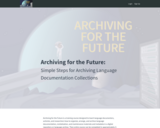
Overview: Archiving for the Future is a free training course designed to teach language documenters, activists, and researchers how to organize, arrange, and archive language documentation, revitalization, and maintenance materials and metadata in a digital repository or language archive. Then entire course can be completed in approximately 3-5 hours.
This course was developed by the staff of the Archive of the Indigenous Languages of Latin America at the University of Texas at Austin in consultation with representatives of various DELAMAN (https://www.delaman.org/) archives and other digital data repositories in the United States, the United Kingdom, the European Union, Australia, and Cameroon.
The course material is based upon work supported by the National Science Foundation under Grant No. BCS-1653380 (September 1, 2016 to August 31, 2020). Any opinions, findings, and conclusions or recommendations expressed in this material are those of the authors and do not necessarily reflect the views of the National Science Foundation.